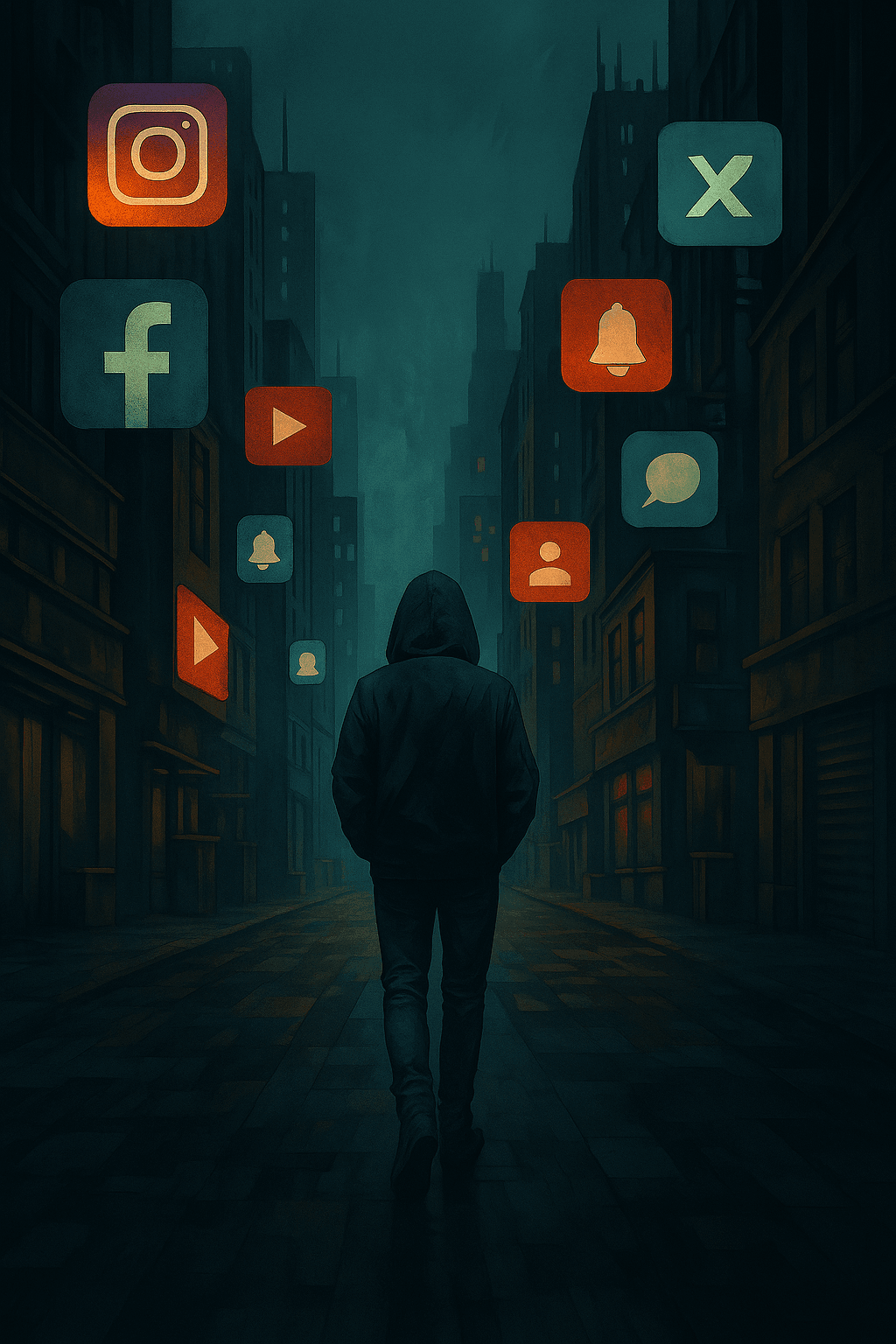I was sitting at my desk, bleary-eyed at 2:23 AM, my face glowing in the light of my screen. I had no reason to still be awake. I wasn’t working. I wasn’t learning. I wasn’t even watching anything meaningful. I was just scrolling. My thumb had become a metronome for my mind’s restlessness, caught in a cycle of checking Instagram, switching to LinkedIn, then Twitter, then back to Instagram, only to stare blankly at content I wasn’t even absorbing.
There is a slang term for this now, it’s called ‘Doomscrolling’. A word that sounds half-funny until you realize you’re living it.
We hear it all the time: “You need to stay connected.” “Networking is everything.” “You can’t get a job without LinkedIn.” “Post every day to grow your brand.” From the moment we enter this digital ecosystem—often in our teens, sometimes even earlier—we’re wired to compare. Likes, views, shares, engagement rates. Even our value starts to feel like something measured in metrics.
We know the warnings. We know people photoshop their faces, fake vacations, buy followers. And yet, we believe what we see. Because that’s how our brains are wired: to trust visual cues, to seek belonging, to fear missing out. Maybe they used fake proof, maybe the job offer was a PR stunt, maybe the relationship isn’t really that perfect. But we don’t know. So we scroll.
We scroll to distract. We scroll to avoid. We scroll when we’re tired, when we’re sad, when we should be asleep, and even when we’re doing something else entirely. A notification pings, and suddenly we’re checking emails, messages, apps—all within minutes of each other. Constant, compulsive connectivity.
They say one of humanity’s greatest achievements is language—the ability to communicate across distance, to share knowledge, to connect. But in this hyper-connected age, I wonder if we’ve stretched that brilliance so far that it snapped.
Because today, we’re connected… but not present.
We text more than we talk. We reply instantly but feel more distant than ever. We’re so accessible that privacy now feels like rebellion. And perhaps the most overlooked side effect of it all? Emotional burnout from always being available.
We think of burnout as something that happens because of excessive studying or work. But there is a quiet, creeping kind of burnout that comes from always being “on.” Always reachable. Always expected to reply, to post, to perform. We long for me-time, but when we get it, we spend it replying to texts or falling deeper into digital rabbit holes. Is that really a break? Is that really rest?
And let’s be honest—we’ve forgotten how to just be. Even meals aren’t sacred anymore. We open Netflix during lunch. Scroll through Instagram with one hand while chewing. Sometimes, we’re texting three different people during dinner. We think we’re relaxing, but we’re really just switching screens. Our brains never get a break from stimulation. What if, instead, we replaced those moments with music? A calming playlist while we eat. An instrumental track while we cook or fold laundry. Something that fills the silence without demanding our attention. Something that lets our minds wander instead of scroll.
And no, the solution isn’t a six-month digital detox in the mountains followed by a dramatic “I’m back and better” Instagram story, despite what influencers might suggest. That’s a fantasy. Most of us can’t afford to disappear. Our jobs, our friendships, our families depend on our responsiveness.
So what do we do? We find balance. Not the aesthetic kind with morning matcha and yoga selfies, but the real kind. Messy. Imperfect. Sustainable.
Here are a few things you could try:
- Create a ‘No Notification Zone’: Not a whole day—just an hour. Pick one hour a day where your phone goes into “Do Not Disturb” mode. Not for sleep. Not for meditation. Just to let your mind breathe without interruption.
- Designate App-Free Rooms: For me, it’s the bathroom. No scrolling. No messages. Create sacred spaces for stillness and actual human thoughts.
- Have a ‘Friend Filter’ Day: If I feel emotionally depleted, I give myself permission to reply only to the people who feel like sunlight—not the ones who drain me. Not everyone deserves instant access to your energy.
- Scroll With Intention: I replaced my homepage with an ebook shortcut. So if I go to my phone out of habit, I land on a book. If I still want to scroll, I ask myself: Am I seeking connection or just stimulation?
- Put Yourself on Your Own Calendar: Literally schedule time with yourself like you would a meeting. And when it comes up? Honour it.
- Change the Medium, Not the Message: If you find yourself needing a break from digital conversations, try voice notes instead of texts. Or handwritten letters if it’s someone close. They feel personal, intentional, and they don’t demand instant replies.
- Solo Walks Without Your Phone (Just Once a Week): Start with 15 minutes. No music. No map. Let your brain detox from stimulation and relearn stillness.
- Digital Wind-Down Alarms: Set a 9:00 PM alarm that doesn’t tell you to sleep—but tells you to log off. Use that hour for journaling, stretching, or even doing nothing. Let your body remember what it feels like to unwind without a screen.
We can’t escape the digital world, especially not in today’s world where visibility does matter. But we can stop letting it run the show. Emotional burnout isn’t always visible, but it is always valid.
Connection is a gift. But so is solitude. And you deserve both.

